

Alzheimer's and Parkinson's Diseases and the Microbiomes. Migraines and the gut microbiome. Blood-Brain Barrier. Psychobiotics. Brain Injury and The Gut Microbiome. What Gut Bacteria Does to the Human Brain. By now, the idea that gut bacteria affects a person’s health is not revolutionary.
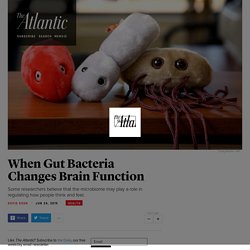
Many people know that these microbes influence digestion, allergies, and metabolism. The trend has become almost commonplace: New books appear regularly detailing precisely which diet will lead to optimum bacterial health. But these microbes’ reach may extend much further, into the human brains. A growing group of researchers around the world are investigating how the microbiome, as this bacterial ecosystem is known, regulates how people think and feel. Scientists have found evidence that this assemblage—about a thousand different species of bacteria, trillions of cells that together weigh between one and three pounds—could play a crucial role in autism, anxiety, depression, and other disorders. Some of the most intriguing work has been done on autism. Microbes can play games with the mind.
The 22 men took the same pill for four weeks.
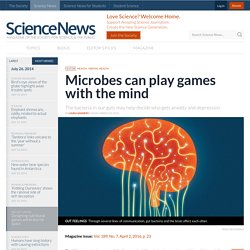
When interviewed, they said they felt less daily stress and their memories were sharper. The brain benefits were subtle, but the results, reported at last year’s annual meeting of the Society for Neuroscience, got attention. That’s because the pills were not a precise chemical formula synthesized by the pharmaceutical industry. The capsules were brimming with bacteria. In the ultimate PR turnaround, once-dreaded bacteria are being welcomed as health heroes. These bacteria are possibly working at more than just keeping our bodies healthy: They may be changing our minds. Association discovered between gut bacteria and brain activity in healthy humans. Do gut bacteria make a second home in our brains? SAN DIEGO, CALIFORNIA—We know the menagerie of microbes in the gut has powerful effects on our health.
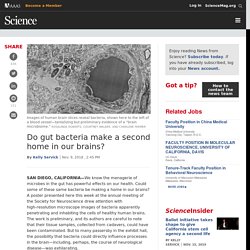
Could some of these same bacteria be making a home in our brains? A poster presented here this week at the annual meeting of the Society for Neuroscience drew attention with high-resolution microscope images of bacteria apparently penetrating and inhabiting the cells of healthy human brains. The work is preliminary, and its authors are careful to note that their tissue samples, collected from cadavers, could have been contaminated. But to many passersby in the exhibit hall, the possibility that bacteria could directly influence processes in the brain—including, perhaps, the course of neurological disease—was exhilarating.
“This is the hit of the week,” said neuroscientist Ronald McGregor of the University of California, Los Angeles, who was not involved in the work. But Walker was persistent, and Roberts started to consult colleagues at UAB. A Healthy Gut is a Prerequisite for a Healthy Brain.
Obsessive Compulsive Disorder (OCD) and the Gut Microbiome. Schizophrenia and the Microbiome. This Is Your Brain on Bugs: How Gut Bacteria Affect Mental Health. As many of you adopt new behaviors and habits during this year’s 21-Day Challenge, there’s a fascinating unseen story going on between your brains and bellies I thought it’d be worth talking about.
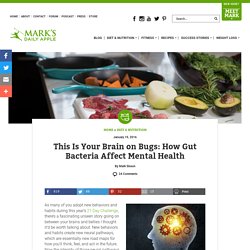
New behaviors and habits create new neural pathways, which are essentially new road maps for how you’ll think, feel, and act in the future. Now the integrity of those neural pathways—whether they’re firing at full force and with the right materials to do their job—is intimately connected to something I’ve talked about on the blog before in different ways: our gut microbiome. But as you’ll see, this microscopic landscape is worth talking about again—specifically because it influences your brain (that grand master of all organs) and how well you’re likely to stick to all those newly adopted changes in the future. The link between your gut and your brain, mental health, and sleep.
Our gut does more than help us digest food; the bacteria that call our intestines home have been implicated in everything from our mental health and sleep, to weight gain and cravings for certain foods.
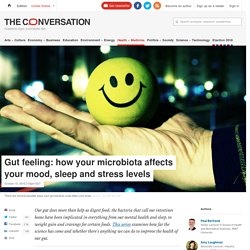
This series examines how far the science has come and whether there’s anything we can do to improve the health of our gut. The gut microbiota is the community of bugs, including bacteria, that live in our intestine. It has been called the body’s “forgotten organ” because of the important role it plays beyond digestion and metabolism. It's Not Mental. Naturopathic Medical Research Clinic (NMRC) Blog.
Walsh Research Institute - Home. How the Microbiome Of Your Gut Is Linked to the Brain and Mental Illness. Know your serotonin: An interview with gut-brain axis researcher Elaine Hsiao. Scientists discover gut bacteria that influences mood by ‘eating’ brain chemical. For the first time, scientists have determined that there are bacteria in the human gut which depend on chemicals from our brain for survival.
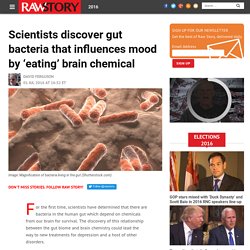
The discovery of this relationship between the gut biome and brain chemistry could lead the way to new treatments for depression and a host of other disorders. New Scientist said Friday that scientists at Boston’s Northeastern University have isolated a group of bacteria that depend upon the brain chemical gamma-aminobutyric acid or GABA — a molecule that the brain uses to calm itself — to survive. For The First Time, Gut Bacteria Has Been Spotted Eating Chemicals In The Brain.
We're creating viewer supported news.

Become a member! Scientists are finally starting to understand the gut and brain connection, and this understanding can lead to huge breakthroughs in regard to various mental disorders, and how what’s going on in the gut could actually be a culprit for many of these illnesses. Many are surprised to learn that an estimated 90% of the serotonin produced by the body actually comes from the gut! This may lead us to believe that proper nutrition, gut microbiome, and digestion might be a key component to a healthy mind. Recently, bacteria have been discovered in the gut that depends solely on one of the chemicals in our brains for survival.
Philip Strandawitz and his colleagues from Northeastern University in Boston have recently discovered that a species of recently discovered gut bacteria, called KLE1738 could only be grown if it was provided with GABA molecules. What Does This Mean For Treatment Of Depression? Is It Really As Simple As Diet? Perhaps. Influence of gut microbiota on neuropsychiatric disorders. Copyright©The Author(s) 2017.
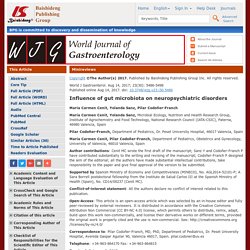
Published by Baishideng Publishing Group Inc. The Gut Microbiome and the Brain. From gut dysbiosis to altered brain function and mental illness: mechanisms and pathways. Video: Mind-altering microbes: how the microbiome affects brain and behavior: Elaine Hsiao at TEDxCaltech. Video: Gut bacteria and mind control: to fix your brain, fix your gut! (1 h) Video Talk: The Microbiome Mind and Brain Interactions (40 minutes) Video Talk: Microbiome, Brain and Behavior - Ted Dinan (30 minutes) Junk Food, Gut, and Brain. Over the years, a scientific consensus has been more or less reached about diet and mental health.
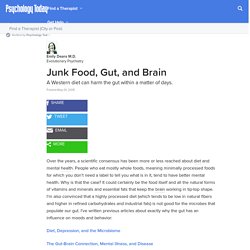
People who eat mostly whole foods, meaning minimally processed foods for which you don’t need a label to tell you what is in it, tend to have better mental health. The Gut Brain Axis and Leaky Gut.
This is a post from the Gut Critters blog that ended November 18, 2016. Ray Medina gave permission for his material to be copied as long as it was attributed to him and not used for commercial purposes. – kiraonysko
The anorexia nervosa gut microbiome differs from healthy controls and is related to mental health — The American Microbiome Institute. Anorexia nervosa is devastating condition in which an individual purposely starves themselves leading to severely low weight.
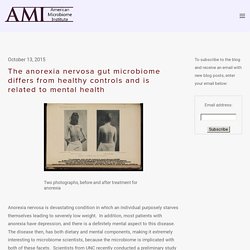
In addition, most patients with anorexia have depression, and there is a definitely mental aspect to this disease. The disease then, has both dietary and mental components, making it extremely interesting to microbiome scientists, because the microbiome is implicated with both of these facets. Scientists from UNC recently conducted a preliminary study on both of these aspects of the disease by comparing the microbiomes and mental state of anorexic patients before and after treatment, along with healthy controls. They published there results last week in the journal Psychosomatic Medicine.
Sixteen patients with anorexia nervosa who sought treatment for their disease had stool samples collected at admission to the hospital as well as their mental health assessed. A future perspective on neurodegenerative diseases: nasopharyngeal and gut microbiotauntitled. Summary Neurodegenerative diseases are considered a serious life-threatening issue regardless of age. Resulting nerve damage progressively affects important activities, such as movement, coordination, balance, breathing, speech and the functioning of vital organs. Reports on the subject have concluded that neurodegenerative disease can be caused by mutations of susceptible genes, alcohol consumption, toxins, chemicals and other unknown environmental factors.
Although several diagnostic techniques can be used to determine aetiologies, the process is difficult and often fails. Associations Between Microbiota, Mitochondrial Function, and Cognition in Chronic Marijuana Users. Leaky intestine and impaired microbiome in an amyotrophic lateral sclerosis mouse model. A Hidden Factor in Stroke Severity: The Microbes in Your Gut. The Gut-Brain Connection: What Remedies Heal & Improve It? You’ve probably used the phrases “I have butterflies in my stomach,” “I have a gut feeling about this” or “there’s a pit in my stomach.” Have you ever wondered why so many of these sayings involve our brains and tummies? As it turns out, it’s not such a coincidence. In fact, the more we learn about the human gut, or our gut microbiome, the more it’s clear that it really is our “second brain.” You’re probably already aware that leaky gut syndrome is linked to serious conditions and diseases.
But science is discovering that the connection between our guts and our emotions is just as strong. 5 Ways to Increase Your Good Gut Bacteria For A Healthier Brain. 4. Don't feed the bad guys with sugar Avoiding sugar is a critical aspect of preventing and treating brain and mental health challenges. Not only does high sugar consumption increase inflammation, but sugar is fuel for bad bacteria. Antibiotics Affect Both Gut Microbiota and Adult Neurogenesis.
Antibiotics which affect levels of gut bacteria can also halt the growth of new brain cells in the hippocampus, a section of the brain associated with memory, reports a study in mice. Researchers also uncovered a clue to why. A type of white blood cell seems to act as a communicator between the brain, the immune system, and the gut. The microbiome’s role in the immune system of the brain — The American Microbiome Institute. A large body of evidence continues to support the microbiome’s role in interacting with the gut-brain axis. Researchers in Germany recently investigated this relationship further by studying how host-microbiota can specifically influence the brain immune system of mice. The researchers studied microglial cells, which are essentially the macrophages of the brain. They patrol for pathogens, help maintain synaptic function, and play an important role in brain development. Unlike macrophages that operate in our peripheral immune system, microglia cells operate behind the blood brain barrier and are thus subject to a different standard of biological rules.
Gut bacteria and the brain: Are we controlled by microbes? Electromagnetic Brain Stimulation for Healthy Gut and Weight Loss. New research finds that a noninvasive electromagnetic brain stimulation technique assists obese people in losing weight, by altering their gut bacteria. Scientists have determined that stimulation of the human brain through noninvasive electromagnetic technique helps obese individuals lose weight. Scientists investigate the 'black box' of bacterial effects on the brain and behaviour. The Cure for Brain Diseases Is in Your Gut. How Your Gut Affects Your Happiness (& 7 Tips to Heal It) That gut feeling. If aliens were to swoop in from outer space and squeeze a human down to see what we're made of, they would come to the conclusion that cell for cell, we're mostly bacteria. In fact, single-celled organisms—mostly bacteria—outnumber our own cells 10 to one, and most of them make their home in the gut.
Diet and microbiome may influence cognitive flexibility — The American Microbiome Institute. Gut to brain dysbiosis: mechanisms linking Western Diet consumption, the microbiome, and cognitive impairment. 1Department of Biological Sciences, University of Southern California, USA 2Department of Neuroscience, University of Southern California, USA Consumption of a Western Diet (WD) that is high in saturated fat and added sugars negatively impacts cognitive function, particularly mnemonic processes that rely on the integrity of the hippocampus. Computational profiling of the gut–brain axis: microflora dysbiosis insights to neurological disorders.
High Fat Diet can Change Behavior and Thoughts. Diets high in fat have long been known to increase the risk for medical problems, including heart disease and stroke, but could the consumption of fatty foods change your behavior and your brain? Neuromicrobiology: How Microbes Influence the Brain - ACS Chemical Neuroscience (ACS Publications) Butyrate, neuroepigenetics and the gut microbiome: Can a high fiber diet improve brain health?
D.N. Frank, A.L. Interview Puts Gut Microbiome at Center of Neurological Health (ALS) In a recent interview, Dr. Our Brains Are Shrinking. A brief summary of a recent review of the gut-brain axis — The American Microbiome Institute. Gutsy Moves: The Amygdala as a Critical Node in Microbiota to Brain Signaling - Cowan - 2017 - BioEssays. The amygdala is a key brain area regulating responses to stress and emotional stimuli, so improving our understanding of how it is regulated could offer novel strategies for treating disturbances in emotion regulation. As we review here, a growing body of evidence indicates that the gut microbiota may contribute to a range of amygdala-dependent brain functions from pain sensitivity to social behavior, emotion regulation, and therefore, psychiatric health.
The Microbiome Podcast returns: Episode 10 with Dr. John Cryan on the gut-brain axis — The American Microbiome Institute. Gut Microbes and the Brain: Paradigm Shift in Neuroscience. Microbial Endocrinology in the Microbiome-Gut-Brain Axis: How Bacterial Production and Utilization of Neurochemicals Influence Behavior. The Gut Microbiome and the Brain. Gut/brain axis and the microbiota. Gut-microbiota-brain axis and effect on neuropsychiatric disorders with suspected immune dysregulation. Microbiota and the Gut-Brain Axis. This Is Your Brain On Fiber. Gut Bacteria & IQ: Could It Really Be? Microglia need microbiota for normal maturation and function.